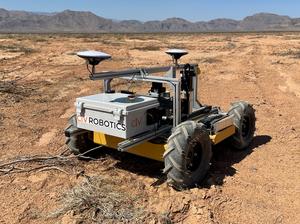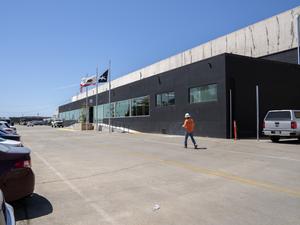![parham[29] copy](https://media.bizj.us/view/img/12349610/parham29-copy*540xx1200-675-0-263.jpg)
We've all heard of software-as-a-service, and maybe its offshoots platform-as-a-service or infrastructure-as-a-service. But how about "recipe-as-a-service"?
That's how a Richmond startup, AICrete, is marketing its business model that produces optimal recipes for concrete to be used by concrete manufacturers.
The company's product uses AI and machine learning modeling to find the perfect recipe, which could vary based on material inputs and the climate where it is produced.
AICrete raised $4 million this week in a seed round led by Clear Ventures and VoLo Earth Ventures with participation from Cortical Ventures.
Parham Aghdasi, the firm's founder and CEO, says the new mixture recipes can be produced in days and can help reduce costs and CO2 output of the process.
Unbeknownst to many, concrete is an incredibly dirty industry and its entire production process produces an estimated 4-8% of global emissions, according to a report by the Royal Institute of International Affairs in London.
Aghdasi contends that by using more locally sourced and environmentally sound ingredients, overall emissions in the industry can be dramatically lowered.
AICrete has tested its process with the California construction materials producer, Clark Pacific, which said it helped them reduce costs in its concrete manufacturing process by 4-5% per cubic yard produces and reduced emissions by 17%.
The endorsement by Clark Pacific has led to to a Fortune 500 cement producer joining VCs in its seed round, but Aghdasi declined to name the firm as of yet.
Aghdasi has an interesting background to say the least. He grew up in Iran, where he was denied entry into to higher education because of his Baha'i faith, and had to get his undergrad degree in civil engineering from an underground Baha'i school in Tehran.
"It was a different experience, where classes were held in basements and living rooms and kitchens and classes were taught by older professors who were kicked out [of universities] back in late 70s, after the revolution," Aghdasi said. "And throughout my education we experienced a couple of raids and arrests, interrogations and incarcerations. I myself was interrogated."
Fortunately some universities actually accept degrees from the underground school, and he was able to apply for an F-1 student visa in the United States and continue into post-grad studies at the University of Texas at Austin.
During his master's studies at UT, then his Ph.D. at UC Berkeley, Aghdasi worked on various concrete-related projects.
"So at that point I had roughly a decade of experience in concrete, but with all the projects it was very rewarding to see what I was working on was making an impact, but I wanted to always make it better," he said. "We would usually just optimize to 'good enough' and then move onto other things and would never go that extra mile to really optimize for sustainability and cost."
At that point he began during his postdoc studies he began researching AI and machine learning to find ways to break past the "good enough" limit of his concrete recipes, then in 2020 was able to raise a bit of VC funding to start his own company.
AICrete currently has about eight employees working out of an office warehouse place in Richmond and plans to expand to 10 or 12 by the end of this year.





